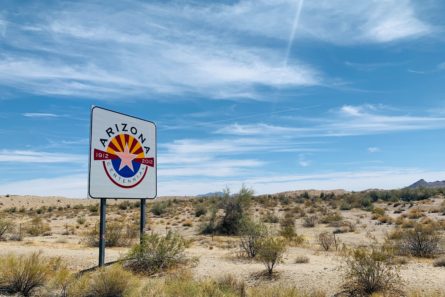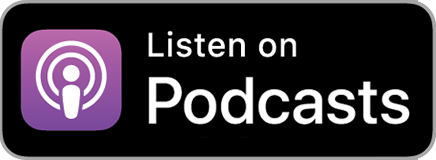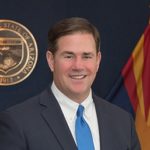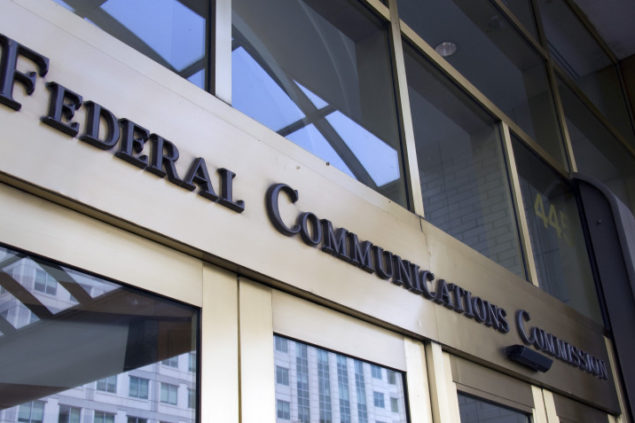Tech Roundup Episode 17 – Governor Doug Ducey on Tech Policy and Innovation

Eight years after he was first sworn in, Arizona Governor Doug Ducey will leave office in January 2023 due to the state’s limit of two consecutive terms. In this episode, Governor Ducey joined tech policy experts Brent Skorup and Adam Thierer to discuss initiatives aimed at boosting innovation Arizona has launched during his time in office. Their conversation covered regulatory sandboxes, occupational licensing reform, autonomous vehicle policy, and much more.
This episode was co-sponsored by the Mercatus Center at George Mason University.
Transcript
Although this transcript is largely accurate, in some cases it could be incomplete or inaccurate due to inaudible passages or transcription errors.
[Music and Narration]
Introduction: Welcome to the Regulatory Transparency Project’s Fourth Branch podcast series. All expressions of opinion are those of the speaker.
Jack Derwin: Welcome to the Regulatory Transparency Project’s Tech Roundup podcast, part of RTP’s Fourth Branch podcast series. My name is Jack Derwin, and I’m Assistant Director of RTP at The Federalist Society. For this episode, we’re very excited to be joined by Arizona Governor Doug Ducey for discussion on tech policy and innovation with Brent Skorup and Adam Thierer. In the interest of time, I’ll keep these intros very brief, but our speakers’ full bios are available at regproject.org. Governor Ducey has served as the 23rd governor of Arizona since 2015 and, due to Arizona’s limit of two consecutive terms, will leave office in January 2023. Governor Ducey was Arizona State Treasurer from 2011 to 2015. And before entering public service, he was CEO of Cold Stone Creamery.
Brent Skorup is a Senior Research Fellow at George Mason University’s Mercatus Center, where his research areas include transportation technology, telecommunications, aviation, and wireless policy. And Adam Thierer, who’ll be our moderator today, is a Senior Fellow at the Mercatus Center, where he specializes in innovation, entrepreneurialism, and internet and free speech issues with a particular focus on the public policy concerns surrounding emerging tech. Finally, I’ll note that, as always, all expressions of opinion on today’s episode are those of our guest speakers. With that, I’ll get out of the way and turn things over to you, Adam.
Adam Thierer: Well, thank you so much, Jack, and thank you, Governor Ducey, for joining us today.
Doug Ducey: Good to be here.
Adam Thierer: Really appreciate it.
Doug Ducey: Thanks for having me.
Adam Thierer: So my colleague, Brent Skorup, and I, we do a lot of work on innovation and entrepreneurialism policy at the Mercatus Center and with our friends at The Federalist Society. And we hear a lot of discussion about innovation culture, which we generally think of as the unique combination of attitudes and public policies that can encourage or influence entrepreneurialism, job creation, labor mobility, and various types of consumer welfare choices. So Arizona is thought by many to be a leading sort of innovation culture state today in the United States and a model for many others. So take us, first, back in time a bit to when you came into office and how you set out an innovation culture for Arizona to lead the nation.
Doug Ducey: Well, thank you for the kind words about Arizona. I came from the private sector. My company was actually Cold Stone Creamery, the ice cream brand. So we opened up 1,440 stores in all 50 states. And in many ways, it was like a policy primer on how easy it is. Anybody that’s ever opened up a lemonade stand knows how an ice cream shop operates. And to see that we could open up in a state like Arizona for nearly $100,000, open and operating selling ice cream, and it was $500,000 plus in California, you start to ask, “Why is this, and how do you make the franchisee successful?” So when I came into office, I wanted to do everything I could, knowing that governors and legislators have nothing to do with creating jobs.
And I always get a kick out of it during the silly season of the election cycle, people talking about the jobs they’re going to create or the jobs that have been created. It’s the private sector, the innovators, and the risk-takers that create the jobs. But a governor can create the environment in which jobs are created. And for me, that was low tax, light regulation, and actually having an effective bureaucracy that could be responsive to any licenses that were necessary and clearing obstacles. So we set out to get the taxes lower and to eliminate regulations. And it was a much heavier lift than I thought. We’ve had a lot of success on the tax front. Today, Arizona has the lowest flat tax in the nation at 2.5 percent. We had the largest tax increase in state history last session. And I think if you took our state tax, income tax, corporate tax, and sales tax, you’d find Arizona to be the most competitive place in the country. And that’s not where we were eight years ago.
But the heavier lift was the reduction of regulations. I said in my first State of the State that if you want to learn something new, read something old. And Barry Goldwater had actually run for president, saying he did not want to pass laws but repeal them. We intended to do the same thing with regulations. But it took us about 18 months with a terrifically talented staff to get our arms around how many regulations the state of Arizona had. It was about 11,000 regulations. We’ve been able to eliminate over 2,100 of those. That’s the equivalent of $171 million tax cut without costing the general fund one penny. I think those two things, combined with a governor that very much enjoys being the chief spokesperson and salesperson for the state, has done a lot to bring innovation to Arizona.
Adam Thierer: That’s great. And specifically, the mechanism you utilize is something we’ve recommended a lot and at our institution, sort of a one-in-two or one-in-three-out kind of approach. And I mean, that was one of your first steps, right? That, and then you also addressed occupational licensing, and sort of did this under the banner of a right to earn a living. Talk to us through about the mechanisms that other governors could follow if they wanted to take your same approach.
Doug Ducey: Well, I think that mindset, that you do have a right, a fundamental right to your labor, and if you want to earn a living, we want you to earn a living — now, people are moving to Arizona from all over the country. I said in my second State of the State I’d be remiss if I didn’t thank my partner in growing Arizona’s economy, and that was then California Governor Jerry Brown. I had no idea that Gavin Newsom would be even more valuable to our population growth.
But what we wanted people to do when they arrived was to be able to earn a living immediately. So we passed something called universal recognition of occupational licensing. We kind of had a paradox on government here. We were going to actually trust your state government, that if you had a license in good standing from wherever you came, we were going to believe your government and allow you to apply it and get to work immediately and begin earning a living. I give credit to our state legislature for passing that. I’ve only got a one-seat majority in both chambers, so everything is a challenge. But we were able to do that. And it was funny to hear because we were the first state in the nation to do that — some of the objections were, “Well, if we do this, we’ll be benefiting people that are moving to Arizona. But what about Arizonians that are moving to Illinois? They won’t have the same option.” So I had to talk to some people that our job was Arizona, and we’d leave Illinois to Illinois.
But I think some new ideas like that bring a mindset, one, we have a job available for anyone that wants one right now. It’s the lowest unemployment in state history. And anybody that wants a better job can find one. Eight years ago, we were very much known for construction and call centers. And listen, there’s dignity in all work, including that work, and we need people in those jobs. But I had a lot of businesspeople from the community that I came from and say, “We’re going to help you. We’re going to support you. We love the state. We’re not going to leave. But my son or daughter who just graduated from you-pick-the-college, well, they can’t apply their degree in the state.” Well, we haven’t heard that for five years. I mean, high-tech, high-paying jobs to the service and tourism sector, opportunity’s abundant in the state of Arizona.
Adam Thierer: That’s great. And you mentioned Illinois. That’s my birth state. I wish you could help that state because, boy, it needs some help.
Doug Ducey: We’re Chicago’s favorite suburb.
Adam Thierer: So let me ask you about one other big picture reform before I turn to my colleague, Brent Skorup, for a few other questions. You’ve done a lot of work on experimental governance in the form of sandboxes.
Doug Ducey: Yes.
Adam Thierer: And Arizona has been a leader first and foremost on the financial sandbox field and then the more broad base—sort of what’s called universal sandboxing—which is an exciting example of what we refer to as decentralized governance or experimental or entrepreneurial governance. Explain to us how that came about and how effective it’s been.
Doug Ducey: Well, we are the home of Barry Goldwater. And Barry Goldwater certainly embraced liberty—the Goldwater Institute remains. They were the folks that promoted Right to Try. And Darcy Olsen was the leader on that. And it’s that mindset that — listen, state government should not be in the business of innovation. We should be doing things that are tried and true. But you do want to have a landscape where innovation can thrive. In many ways—I don’t know if we’re going to talk about education today, but I’ll use the same analogy—America never really solves a problem. We innovate out of it. And these new industries of Fintech and Proptech, things that we’re now starting to understand — we did some things with guardrails that allowed the private sector to thrive to bring new ideas where consumers and participants would be protected to a certain degree but also realized they’re taking a risk. There’s no guaranteed upside but allow that to then, the dynamism of the marketplace — to figure things out, and then policymakers can come in and say what’s necessary here to protect either public health or public consumption. And if nothing’s necessary, then let’s not do anything.
Adam Thierer: That’s great. So Governor, my colleague, Brent Skorup’s an expert on broadband transportation technology, driverless cars, and drones, and more. So I’m going to let him ask you a few questions about specific reforms Arizona’s undertaken on those fronts.
Doug Ducey: Yes.
Brent Skorup: Yeah, Governor, I just want to say thank you for making the time today. I’m an economic refugee from Illinois. I know there’s many of us in Arizona.
Doug Ducey: You’re fleeing. You’re fleeing.
Brent Skorup: Yeah. I mean, you’ve got Portillo’s in Arizona.
Doug Ducey: We have several. And we have several more being more being built.
Brent Skorup: Yep, yep.
Doug Ducey: What a concept. I mean, it’s incredible.
Brent Skorup: Yeah. I was very happy to see that. I do tech policy, and I think for many of us in tech policy, what put you and your state on the radar for us was, several years ago, the autonomous vehicle —
Doug Ducey: Yes.
Brent Skorup: — policies you put in place. And I know several years ago — but I’m curious if you could walk us through what happened. As I understand it—and I’ll just say for the audience—my impression of that, you put a task force in place and, probably speaking, took this permissive approach to autonomous vehicles with some oversight because, obviously, public safety is implicated by having autonomous vehicle testing on public roadways. But I was very encouraged by that.
I think you’ve seen other — I mean, I know you’ve seen other states take that model, apply it to autonomous vehicles, apply it to drones, apply it to passenger drones now today. I just want to add I see traffic safety as a huge public health crisis.
Doug Ducey: Yes.
Brent Skorup: The numbers are astounding, 38,000 deaths every year, many of these people in the primes of their lives. Autonomous vehicles will become part of improving traffic safety in the future. And so, I’m just really encouraged by what I saw. I can’t remember what year you did that, but can you walk us through autonomous vehicle—was this 2018, 2019 —
Doug Ducey: A little earlier than that.
Brent Skorup: — and what happened there? Yeah. Right.
Doug Ducey: Yes. Actually, in my first month as governor, we were hosting the Superbowl that year. And I was interviewing the agency heads that existed in government—all the people that helped me get into the governor’s office didn’t necessarily want to come work with me in the governor’s office. So I had to find out who was worthy of staying and basically asking agency heads, “Who are you, and what do you do? And how do you know if you’re doing it well?” And the guy that was leading the Department of Weights and Measures shared with me his plans to sting Uber and Lyft during the Superbowl and shut them down. And I thought, “Well, this guy certainly didn’t pay attention to the campaign.”
And it was the first time I talked to my general counsel about what my authority was over agency heads, and they serve at the pleasure of the governor. So he was returned to the private sector at that moment, and we brought somebody new in. And we also made it clear that that would not happen. And you would have thought I’d freed all the prisoners the way the press responded to this. They couldn’t believe that an agency head was fired, and they also thought that the regulations that had been written decades earlier for taxicabs could be applied to Uber and Lyft. So we made certain, in no unclear terms, that that was not going to happen. I don’t know if you’re watching this series on HBO of Travis Kalanick and Super Pumped with Uber. But that actually — I had never met Uber or Lyft. I, of course, was a customer. It was also eye-opening to me.
I asked the press at that time—and this was 2015—how many of them had ever taken an Uber. And not one of them—the state capitol press—had taken an Uber. And I said, “Well, these very convenient, very safe — people make better decisions.” Both Uber and Lyft were grateful because a lot of these big city mayors, including Phoenix’s, were trying to shut them down at the airport. And then, California started to charge Uber a fee to test their autonomous vehicles. And it was a few days before Christmas in 2015 or 2016—I can’t recall—but we were going to go on a family vacation. And Travis Kalanick called me, and he said, “Do you want to have some fun?” I said, “Well, what does that mean, Travis?” And he said, “I’m going to bring every autonomous car to Arizona, and we’re done with California.” So they came in on a double-wide with all the cars stacked up, and we began testing with Uber. Google was soon to follow with Waymo.
And the motivation was, one, we did want to be a place for innovation and welcoming of technology. We did see California as a major competitor. We thought we could be a better quality of life with the same attributes of Silicon Valley. But we were able to work with these organizations, I think have responsible protocols in place, and the motivation is public safety. You mentioned the tens of thousands of people that die every year through a human error. Now, of course, autonomy has not yet been perfected. It has come a long, long way, and we’re seeing some of these products being put to use in terms of food delivery on sidewalks, on campuses. You’ll see it at Arizona State University when you’re there. But I just don’t think we’re all that far away.
And at the time, I was thinking about my grandmother, who was 95 at the time. She was still alert. She still loved to be out and about. She couldn’t drive, and wouldn’t one of these vehicles be a terrific convenience for her and people that are blind and handicapped and disabled in addition to just people that are commuters? I mean, as governor, you enjoy a detail. And it’s amazing to me how much work you can get done in the car from the time you leave your home until you get to the office. So you’re talking real increase in productivity and quality of life as well. So those are the types of ideas that we welcome. I’ve talked to other governors about where they go for economic development. And you’ll hear — before the previous administration, you’d hear people talk about Shanghai or Beijing or Seoul or Tokyo. I’ve done a lot of economic development by going over to California and letting people know how welcoming we would be to this, how we would embrace new ideas, and at least let them thrive. Of course, we’re going to protect public health and public safety. But I think oftentimes, many of the regulators and bureaucracies can actually stop those innovations or make them feel unwelcome before they stop. That doesn’t happen in Arizona.
Adam Thierer: It’s a great example of competitive federalism at its finest —
Doug Ducey: Yes.
Adam Thierer: — and what we sometimes call innovation arbitrage. Innovators and investors shop around for where they’re going to be treated most hospitably. Increasingly, that’s Arizona.
Doug Ducey: That’s what frustrates me so much about coming to Washington, DC, is this is like Rome. All roads go through Washington, DC. And even some of the smart guys on my side, if I’m on a panel or a podcast like this with them and they get asked a question, they always have a federal solution rather than saying that’s out of our lane. And I do think if we had more of a laboratories of democracy among the states — when you become a new governor, you are actually invited to something called new governor’s school. It was very helpful to me. It’s led by the NGA. And at the first break, I had to go up to my hotel room and google John Hickenlooper and Steve Bullock because I couldn’t tell what party they were in. And it dawned on me then that they didn’t want Barack Obama running Colorado or Montana any more than I wanted him running Arizona. And I think most governors feel that way. So if we could find a way where Washington would stay in its lane—and it’s certainly here for a reason and there are worthy things to do—but there’s also so many things that could just be offloaded back to the states, full programs and dollars with no strings attached, and then let those governors and state legislators compete.
Adam Thierer: Brent, you had a question about broadband or drones?
Brent Skorup: Well, I just want to follow up and say, I mean, you really did start something. You saw governors across the nation really tripping over each other to invite autonomous vehicle companies come test on public roads after that. I know the democratic governor — I mean, this was not a Republican-Democrat thing. You had a Democratic governor in Virginia boasting that they were — they were permissive about autonomous vehicles.
Doug Ducey: Was that Northam or McAuliffe?
Brent Skorup: McAuliffe.
Adam Thierer: McAuliffe, yeah.
Doug Ducey: He liked to copy a lot of our good ideas.
Brent Skorup: Yeah.
Doug Ducey: I’m joking. I mean, I actually think when there is success in a state, governors do apply, just like businesspeople, best practices, where you say we’re going to reapply that, sometimes with attributions, sometimes without.
Brent Skorup: Yeah, no. I think it’s to their credit and Republican governors as well. And it really did jumpstart. Now, you are seeing this, as I said, in the areas where I work, which is drone policy and passenger drone policy and what’s called the advanced aviation industry. There are probably two dozen states that are creating task forces to, much like you did, experts and academics discussing, “How do these old laws and policies interact with a new industry that was not anticipated?” And you’re seeing that happen all across the nation. Yeah. I’m curious what’s — your term is winding up within a year. I’m curious on the regulatory side, the tech policy side, what’s an issue that you wish you could have spent more time on or that you think governors in the upcoming years need to spend more time on—again, on the regulatory reform or tech policy side?
Doug Ducey: Well, it’s encouraging to me seeing governors—like you mentioned Terry McAuliffe or Jared Polis in Colorado, Gina Raimondo to a large degree in Rhode Island — I do think, as thrilled as I am as what we’ve been able to achieve in contrast to California — and I’m under obligation and contract to take full advantage of it for the next 235 days. And it’s been great for Arizona. I don’t think it’s great for our country. Ronald Reagan said, had the Pilgrims landed on the West Coast, they would have never bothered to discover the rest of the country. Yet, you see this mass exodus today to places like Arizona, Texas, Tennessee, and Florida. This is pretty simple policy that we’re all applying that can be applied elsewhere.
And it wasn’t that long ago that the way it was painted — a failed governor of a small state was elected president, and he was actually considered to be damn good on the economy. And that was Bill Clinton of Arkansas. And somehow, the economy has become a partisan issue, where it used to be something where, “Hey, we were going to provide opportunity for all, unleash the economic dynamism of our nation. And we may argue a little bit about the social safety net and how we cared for the most vulnerable.” But it seems to me that so many of these blue state governors have actually taken a page out of big city mayors’ book, and COVID-19 really demonstrated that.
I mean, small businesses were crushed to earth. Schools were shut down, oftentimes unnecessarily. Even today, we’re hearing about unnecessary vaccine and mask mandates. And I think if we look to basically the more conservative states that realize that it’s the individual, the family, and the small business that make the place run and tick and hum, you’ll see much more success, a higher quality of life. And Americans vote with their feet. We’re proud that people are packing up U-Haul trucks and coming to our state. We think it’s a sign of choosing.
Adam Thierer: Another one of your boldest reforms, Governor, involved the Right to Try, and now you’re off to Right to Try 2.0. So this is a really bold set of reforms and really exciting for many of us who’ve worked in this area for a long time and wonder will we ever get traction again at the federal level on this. The answer has been, unfortunately, not much. But now, you’ve made progress on this. Explain to us first what we mean by right to try and then how you’ve done this.
Doug Ducey: Well, again, this is a reform. The Goldwater Institute has been a font of good ideas. I think you heard the former President Trump talk about Right to Try in one of his State of the Union speeches. These are people that are in the worst of circumstances that have run out of options, and yet we know, and we’ve seen in many ways, the modern medical miracles that are possible but how they get stuck at the regulatory framework, at the FDA and other federal agencies. So this is the opportunity, in consultation with doctors, for people to try different therapies that can be efficacious for them, and they get to make that decision in full consultation. And we want to remove every possible legal obstacle. And we’re not talking about people out there experimenting. We’re talking about people in dire need.
Adam Thierer: Mm-hmm. Absolutely. Brent, do you have any other questions on more targeted issues? Broadband, perhaps.
Brent Skorup: Yeah. I wonder if you could speak about the broadband issues. I know you and your office prioritize broadband, particularly in rural and tribal areas. And if you could speak to that, there’s a lot of federal funding coming at the states.
Doug Ducey: Yes.
Brent Skorup: Over the past couple years, there’s billions from the Treasury Department, billions from MTIA, which is part of the Federal Commerce Department. Can you talk about what your state has done and just what you’ve heard about the importance of broadband and, frankly, how you prevent — or how do you keep this money going where it belongs because this will be a big issue for states as literally tens of billions of dollars come at states in the next couple years?
Doug Ducey: Well, I believe in opportunity for all. That was the theme of the campaign in 2014. And opportunity for all includes our rural communities, includes our tribal communities. And yes, the urban core already has this broadband. And in many ways—I mean, you know this hear being in DC—it’s much like electricity. If you can’t connect, you really can’t compete. And there’s many people that don’t aspire to one day move to Phoenix or Scottsdale. They’re happy living in Mohave County, and that’s where they want to stay. But they may have entrepreneurial energies, and they should be able to access the internet. Their kids should be able to learn and, where appropriate, have distance learning available. So I think everything under the economy, public health, we’re the first state to codify telehealth post-pandemic so that people don’t have to drive to the big city to meet with an excellent doctor. I am concerned, although grateful — I think there’s a number of things that Congress did right during the pandemic. They certainly strengthened and stretched the social safety net.
Now, in Arizona, we think it went on too long. We actually stopped paying people to stay home, not work. We flipped that and used the dollars to bonus people to go back to work. But we stopped paying out supplemental dollars. We just said jobs are available. The virus has subsided. You get a $2,000 bonus for going back to work full time. If you were in a situation where you couldn’t go to work full time, you get $1,000 bonus to go back. And now, we do have a river of resources that are coming from the federal government. Like I said, for the things that we can apply them to, I think there’s purchase there. I also think this is the answer to the question of, “Why do we have inflation that’s not transitory?” I mean, my economics teacher said it was too many dollars chasing too few goods, and we’re sitting on $5.2 billion surplus in Arizona. This is on a $8 billion budget when I came into office, and we had a $1 billion deficit.
So you can just see, yes, I’m proud of our economy. Yes, we have been able to lower taxes. Yes, we had been running surpluses. But part of the reason that it is so immense right now is the amount of printing and borrowing that’s coming from the federal government. So this is really where governors come into play—their teams and administrative heads. We met with Mitch Landrieu yesterday. I find him very effective on how he’s working these programs around infrastructure and the reconciliation bill. And we’ve got our chief operating officer working with our commerce authority working with our leader on the energy component to work together in cross purposes working with the federal government. And Mitch, as a mayor, knows how maddening it can be to apply a federal dollar to a local issue.
So I have some confidence that we’re going to be able to this on the broadband front along with some other things around electric vehicles, these hydrogen hubs. There’s a lot of opportunity here. But the important thing is to make sure this money just doesn’t evaporate into the ether, that it actually comes back in improving the lives of everyday Arizonans in our communities that are outside of the big city.
Adam Thierer: Governor, as our time winds down, let me ask you if – first, if you want to talk about any of your other priorities before you leave office, including — you mentioned education as a priority. But also, I want to ask you to talk to your fellow governors here and say — I can understand them probably expressing frustration when they hear you talk, like, “Oh, it’s Arizona. Ducey had it easy.” But you didn’t have it easy. You had a lot of opposition to all of these bold ideas. So how would you communicate to them when they face challenges on these fronts and say you can do it, too? Because I know you work with the Republican Governors Association and many other Democratic governors as well, what would your advice to them be and what you’ve learned in the process?
Doug Ducey: Well, I would say looking out across the landscape, I think governors really make things happen. Some of my Democratic peers might make different things happen than I would have happen, but the great thing about being a governor is you are the chief executive officer. You get to paint the vision, chart the course, pick the people, and put your agenda into place. So I see a lot of governors having the success that at least they want to or that they ran on. I would encourage governors — I’d like us to get more on this same page to lobby the United States Congress to offload some of what they’re doing. I mean, how about you guys focus on defense and foreign policy, possibly secure the border and reform immigration, and give us the rest and let us have at it. And I think we’d see what the founders intended in terms of a true federal system, a Washington, DC with powers that were few and defined, and the others left to the states.
And I do think governors, while we’re collegial and we do collaborate, at the end of the day, we’re competitive. I want to have lower taxes than the folks in my conference. And I do think we like to brag. And you see right now so much of this flow of people to these red states. Well, the way that’s going to be fixed is the pendulum’s going to swing back. You know, it was amazing during the pandemic seeing Andrew Cuomo on TV every day. And one of the press conference I caught, somebody asked him about the exodus of people out of New York to Florida. And he said, “Well, I’m going to have them over to my house. I’m going to cook. I’m going to persuade them.” And it’s just amazing to me that they don’t understand just lower taxes a little bit, lighten the burden.
Adam Thierer: Right.
Doug Ducey: And we’ve seen that as well in Arizona with out-of-state interest trying to come and actually target our most successful producers with the highest tax rate. Luckily, we were able to stop that and reverse it. And today, we have the lowest flat tax in the nation. So I think governors, by and large, are getting done what they want to get done. I think we should be asking for more responsibility. I think we’d have more involvement and focus on state government, and then we’d actually be able to see solutions because we’re not seeing that out of Washington, DC today. And in many ways, it’s because they’re trying to do way too much, and they’re doing most of it poorly.
Adam Thierer: Right. So before I turn it back over to Jack, to close us out, let me just thank you, Governor, for being here. And any other—I know you’re here talking about education in ton—any other priorities you want to mention before we wrap up?
Doug Ducey: Well, the number one line item on every state budget—and this is all 50 governors—is education. And I think we see that education is not working. It’s flatlined since 1972 in the United States with an unbelievable amount of investment. We’re spending $14,656 per student in Arizona, and I always try to get out of the mindset that somehow spending is the measure of success. We’re proud that our kids are leading the nation in improvement in math and reading. But where this is happening is where parents have a choice. We have more charter schools in the state of Arizona, over 550. These are schools of choice. Public schools, open to all but with private management where they could actually hire the people around the table here to possibly teach economics or student government, those types of things that don’t need the traditional certifications. We’ve got over 20 percent of our students in Arizona—over 200,000 kids—in those schools. Those schools, if you took those kids, are the number one performing state in the nation in terms of math, reading, science, and American civics. So this really works.
I’d like to see the next innovation be what we call educational savings accounts—actually backpack funding. I have found that parents are very good consumers, and they know when their child is not being challenged or learning something of value. And if we put that in the position where they were actually the customer, the client, in these public district K12 settings rather than just another number who had to take what they got and didn’t have much ability to push back or ask for some special attention, I think we’d get dramatically better outcomes in K12. And when K12 education is working, all the other things in public policy will just be better.
State budgets are pretty simple to understand. We educate, medicate, and incarcerate. That’s about 97 percent of the budget. You get the education right, you’re going to really reduce the incarceration part of it. People are going to make better personal decisions around their healthcare as well. So I’m a big fan of focusing on education. And please, Washington, DC, stop trying to help us on this. Just push those dollars back and let the states innovate but also give us the opportunity to do that. What the Biden administration has done in recent months to try to stop and cripple charter schools is really mind-boggling, especially when this issue, just the day before yesterday it seemed, was a bipartisan issue being championed by people like Michael Bloomberg in New York City.
Adam Thierer: Yeah. Well, that’s really exciting. And thank you, Governor, for spending time talking about these issues with Brent and I today. And thank you for providing a model –.
Doug Ducey: Thanks for having me. Thanks for the good work you do.
Adam Thierer: Thanks for providing a model for innovation culture for all other states to follow. So with that, I’ll turn it back to Jack to wrap us up.
Jack Derwin: Can’t thank you enough, Governor, Adam, Brent for taking the time to join us today for this great discussion. And thank you to our audience for tuning into this episode of RTP’s Tech Roundup Podcast. You can subscribe on any major podcast platform and check out our website, regproject.org, or our social media account @fedsocrtp to stay up to date. Thank you.
[Music]
Conclusion: On behalf of The Federalist Society’s Regulatory Transparency Project, thanks for tuning in to the Fourth Branch podcast. To catch every new episode when it’s released, you can subscribe on Apple Podcasts, Google Play, and Spreaker. For the latest from RTP, please visit our website at www.regproject.org.
[Music]
This has been a FedSoc audio production.

Speakers
Topic
Sponsor
Mercatus Center at George Mason University
The Federalist Society and Regulatory Transparency Project take no position on particular legal or public policy matters. All expressions of opinion are those of the speaker(s). To join the debate, please email us at [email protected].









